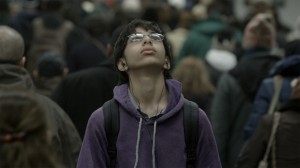Yes, I know what I said at the beginning of our Wisconsin Film Festival coverage about capsule reviews. We followed through on that pledge with some roomy discussions of seven feature films or programs (and a few more to come), many of which will not get similar coverage in the local print media. But now it is crunch time, and we’ve seen far more films than we’ll be able to write full reviews for before the Festival starts on Thursday, April 3. Also, as it turns out, the distributors for some of these films have asked the media covering the Festival to limit their coverage to capsule reviews until the films return to Madison for a theatrical run (if/when that actually happens).
So Jake Smith and I will collaborate on contributing some quick capsule reviews to this post. Time permitting, we will add some after it is initially published, so check back in the coming week and during the Festival.
Also, be sure to check out my four capsule reviews in this week’s Isthmus and The Daily Page: Shooter and Whitley, A Spell to Hold Off the Darkness, Village at the End of the World, and The Rocket. And Jake and I discussed several of these titles with Scott Gordon (Arts Extract) and David Klein (LakeFrontRow) during two episodes of the Arts Extract Podcast dedicated to the Wisconsin Film Festival.
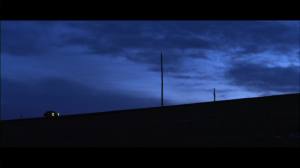 AB- (Daniel Klein, USA, 2013, 9 min)
AB- (Daniel Klein, USA, 2013, 9 min)
Wisconsin Film Festival, Saturday, April 5, 7:00pm; Monday, April 7, 4:45pm»
A couple driving along a remote country road suddenly runs over something and crashes their car. As painful as the crash was, it is only the beginning of their suffering in this scary and well shot short film by Daniel Klein. While there was one bothersome problem of script execution, the premise was enough to win me over—a premise which I will not divulge further here. After all, you can only give so much plot away when discussing a short. Nevertheless, I’d recommend taking a look at this one if you have the chance. Just know that you may never think about a country drive the same way ever again.
This film plays alongside the feature Coherence, which my colleague Jim reviews below. (JS)
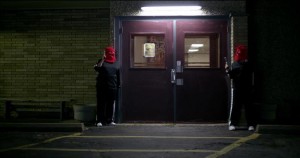 Bingo Night (Jordan Liebowitz, USA, 2014, 13 min)
Bingo Night (Jordan Liebowitz, USA, 2014, 13 min)
Wisconsin Film Festival, Saturday, April 5, 6:15pm»
In this charming but fleeting short film that is screening as part of the Short Films from Wisconsin’s Own program, a trio of elderly women band together to take down a serious score…the take from a bingo night. With a fairly conventional heist plot, debut director Jordan Liebowitz shows a solid sense of comic timing and has two delightful leads in Lynne Stewart and Mindy Sterling—the latter you might recognize as Frau Farbissina in the Austin Powers series. However, I could have done without the brief scene in the dojo or the aftermath. Even though both were quite funny, they seemed to belong in different movies. I will say this: I don’t think I’ve seen a funnier use of a neon sign as a “bright idea” bulb. (JS)
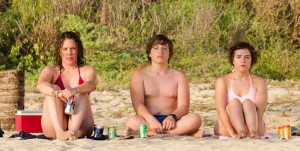
Club Sandwich (Fernando Eimbcke, Mexico, 2013, 82 min)
Wisconsin Film Festival, Saturday, April 5, 7:00pm; Monday, April 7, 4:45pm»
Those who like their comedies very, very dry should enjoy Club Sandwich, the latest from Mexican director Fernando Eimbcke (Lake Tahoe). Young single-mother Paloma (Maria Renee Prudencio) takes her fifteen year-old son Hector (Lucio Gimenez Cacho) on an off-season vacation in a mostly empty resort. This leaves Paloma and Hector with a lot of quality time together, until Hector meets one of the few other guests at the resort, fifteen year-old Jazmin (Danae Reynaud). Despite being a reasonably hip, savvy mother, Paloma has some difficulty dealing with Hector’s interest in Jazmin. The repetitive focus on the quotidian routines in the empty resort starts to wear thin in the first half of the film. But Eimbcke’s minimalist style works best in the second half as humor is mined from awkward pauses and many things left unsaid. (JLK)
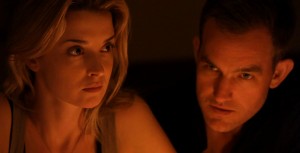
Coherence (James Ward Byrkit, USA, 2013, 89 min)
Wisconsin Film Festival, Saturday, April 5, 9:30pm; Sunday, April 6, 1:00pm»
Our colleagues Scott Gordon and David Klein posted a fun and useful chat about Coherence at the Arts Extract site. For this capsule review, I’ll simply crash in on their conversation. I liked the film more than either of them, but I wouldn’t disagree with most of their individual comments and observations. I think the film gets more interesting as it goes on, as it drops the unsuccessful attempt to make us also care about the character’s petty relationship problems. In other words, this is one of those rare instances where the film would work better if the characters were less fleshed out so that we could just enjoy the narrative puzzle. Coherence alternates between a clunky setup and very well designed actions and reactions to the world it creates. I liked how the film establishes rules, but then expands and complicates that world without breaking the earlier rules. This should be a fun film to watch with a crowd, because at some point someone is going to start yelling at these people (and that seems to be by design). (JLK)

The Congress (Ari Foleman, France/Israel, 2013, 100 min)
Wisconsin Film Festival, Sunday, April 6, 6:00pm; Monday, April 7, 6:00pm»
In this loose adaptation of Stanislaw Lem’s The Futurological Congress, Robin Wright stars as Robin Wright, an aging actress in Hollywood who agrees to a 20-year contract to digitize her image for use in films produced using only digitized actors. By the time her contract is up for renewal, virtual technologies have evolved to the point that people have become consumed by their chemically induced animated virtual selves, and Wright discovers the role that she (and her image) has played in spreading that addiction.
The live-action first act features some very stiff acting, especially from Harvey Keitel as Wright’s agent. But one can’t entirely blame Keitel for the nearly undeliverable monologue the agent must deliver to encourage Wright to continue the digitization process. Once Wright enters the animated zone of The Congress, a kind of virtual five-star hotel, the film finally takes off with bursts of imagination and satire. Just as quickly, however, it then gets trapped in its own layers-of-reality game, which undermines the dramatic tension (when everything is just another layer, you begin to stop caring about what does or doesn’t happen to Wright). The animation is richer and more fluid than Foleman’s Waltz with Bashir, so even at its most self-indulgent The Congress is a fun head trip. But it isn’t until the very end, when Wright has to make a decision whether to attempt to find her now-adult son, that the film finally strikes the right balance between the transformational powers of animation, the fantastic possibilities of the virtual premise, and the dramatic consequences of making a difficult decision. (JLK)
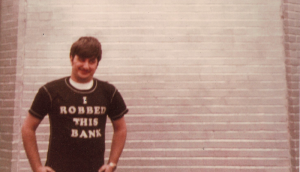 The Dog (Allison Berg & Frank Keraudren, USA, 2013, 100 min)
The Dog (Allison Berg & Frank Keraudren, USA, 2013, 100 min)
Wisconsin Film Festival, Friday, April 4, 4:15pm; Sunday, April 6, 8:15pm»
You may know Dog Day Afternoon, now meet “The Dog” himself. This documentary examines the life of John Wojtowicz, who attempted to rob a New York City bank in 1972, ostensibly in order to pay for his boyfriend’s sex change operation. Through interviews with Wojtowicz and many of the people closest to him, as well as vintage news clips from the 1970s, the film gives us a look at an inveterate character, painting a multifaceted portrait that is dizzying, amusing, horrifying, and ultimately quite moving.
Portions of the movie are also far more intriguing as a sort of historiography of the LGBT movement in New York City at the time, though I think the film might done more to problematize Wojtowicz’s own role in that movement. That said, the care the filmmakers took to compose a complex portrait of this man is praiseworthy. Reconciling so many conflicting motivations for and sides to a story is an engaging activity during a movie, and certainly a rewarding one after it ends. (JS)
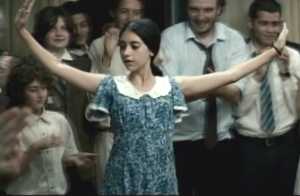 In Bloom (Nana Ekvtimishvili, Simon Gross, Georgia/Germany, 2013, 102 min)
In Bloom (Nana Ekvtimishvili, Simon Gross, Georgia/Germany, 2013, 102 min)
Wisconsin Film Festival, Friday, April 4, 9:15pm, Thursday, April 10, 2:15pm»
Let’s try something different for this capsule: I just want to discuss one shot from In Bloom. It is one of my favorite shots, and favorite moments, in any of the Festival films I’ve previewed so far. It is a great example of deceptively simple visual storytelling, or perhaps I should use the screenwriting mantra, “showing, not telling.” It also showcases the impact that dance can have on our experience of the cinema.
The film focuses on the friendship between two fourteen-year-old girls, Eka and Natia, who live in the Georgian city of Tbilisi shortly after the fall of the Soviet Union. The growing Georgian civil conflict is always looming in the background, but the girls more immediately face the perils of the male-dominated culture in which they must survive. In the shot in question, Eka attends Natia’s wedding sporting a black eye, which she received during her efforts to save Natia from the man that Natia has now married. Throughout the film to this point, Natia has been the more dominant personality in the friendship, and she is not pleased that Eka disapproves of the wedding. But now Eka takes control of the moment, and the room, by dancing a solo dance in the middle of the wedding reception.
The long take actually begins with Natia’s drunk father dancing with a woman as Eka crosses the screen. The camera follows Eka to the side of the dance floor, where she looks down and takes a drink. The then turns and pushes her way back to the dance floor, and extends her arms as she takes over the floor and begins her dance. Her movements are simple but deliberate, and she asserts herself within this culturally sanctioned dance. The camera stays in one spot for about three minutes and simply reframes Eka with pans and tilts. It’s hard to think of a similar simple scene in any other recent film that has the equivalent dynamic energy and narrative weight of this shot.
Despite being somewhat dominated by Natia in the first half of the film, Eka figures out a way to survive this environment on her own, and in the end she provides important guidance for Natia. Eka’s story sneaks up on you in the film, and her dance is a crucial turning point. (JLK)
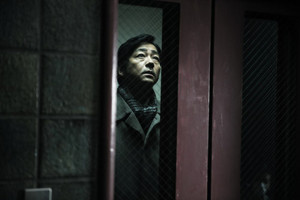 R100 (Hitoshi Matsumoto, Japan, 2013, 100 min)
R100 (Hitoshi Matsumoto, Japan, 2013, 100 min)
Wisconsin Film Festival, Friday, April 4, 9:15pm; Sunday, April 6, 8:15pm»
When I saw Big Man Japan at the Festival a few years back, I thought it was pretty crazy, but this new film from Hitoshi Matsumoto is off-the-rails bonkers. A man engages the services of a highly exclusive S&M club to provide him with the pleasures of getting the crap kicked out of him in public and private by beautiful leather-clad ladies. When the contract becomes too much for him and he tries to get out of it, the club raises the stakes and starts hitting him where he lives, both literally and figuratively. Full of abrupt tonal shifts, absurd dialogue, and a hilarious soundtrack, this film always goes where you least expect it to, from its startling opening scene to its positively bewildering ending.
While one critic wrote that this movie plays like “Fight Club directed by Luis Buñuel,” I liken it more to a less remembered David Fincher film, The Game. Instead of it being a birthday gift, the protagonist deliberately puts himself into a situation of ever increasing stakes and conspiracies around every corner until he is inescapably swept away by the story. It is at once an uproarious and harrowing viewing experience. Plus, get ready for the best conversation about philosophy ever held aboard a carousel! (JS)
Stand Clear of the Closing Doors (Sam Fleischner, USA, 2013, 103 min)
Wisconsin Film Festival, Friday, April 4, 11:45am; Sunday April 6, 11:00am»
A well meaning but dramatically flat independent feature about Ricky, an autistic teenage boy who gets lost in the New York City subway system. The film has been generally praised for its “lyrical vision” of New York City, and indeed it works best in moments when observing the textures of the city. But most of the characters undercut any narrative momentum by avoiding dramatic conflict, so the potential range of consequences for an autistic missing person case turns into a relatively simple waiting game. Just count the times that Ricky’s mother seems to want to avoid a topic of conversation, and you’ll see what I mean. The motif of Ricky trying to follow a red dragon gang logo through the subway system comes across as forced and contrived, but without it we would have even less narrative momentum.
So perhaps I should have shifted perceptual gears and focused on the lyricism rather than narrative? I don’t think there’s enough to go around here, either. Full disclosure: You know from reading elsewhere on this site that I’m all for slow, deliberate pacing, but this has to be the slowest-feeling 103 minutes in recent memory. I actually had to stop and start several times to get through it, which is unfair to the film, so keep in mind it might play better with a crowd. (JLK)
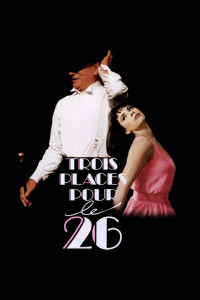 Three Seats for the 26th (Jacques Demy, France, 1988, 106 min)
Three Seats for the 26th (Jacques Demy, France, 1988, 106 min)
Wisconsin Film Festival, Wednesday, April 9, 6:15pm; Thursday, April 10, 1:30pm»
I’ve said it before and I’ll say it again: Jacques Demy had access to a color wheel that the rest of us mere mortals simply do not. Take those pastel colors, add French screen legend Yves Montand, throw in some denim vests and shoulder pads, and mix with a dose of Michel Legrand synth music, and you’ve got Three Seats for the 26th, which was Demy’s last film. MFF contributor Taylor Hanley wrote about the fantastic nature of Lola, and that sensibility is amped up here, 1980s-style.
Montand plays himself, returning to Marseilles to put on an autobiographical stage production and hoping to reunite with an old flame. Meanwhile, Marion (Mathilda May) greatly admires Montand and is looking for a way to get three seats for the show, only to end up joining the cast. They may start as veteran star and ingénue, but as the film progresses, it turns out that they may have a closer relationship than they realize. Certainly a lesser film than The Umbrellas of Cherbourg or Lola, I still find this film both entertaining and intriguing, despite the seemingly haphazard way the plot is tied up. And I think we should all, at least once in our lives, hop off a train to find reporters ready interview us via a synchronized song-and-dance routine.
Remember: if you enjoy the Demy films at the festival, UW Cinematheque will be bringing more of them your way after the festival ends. (JS)
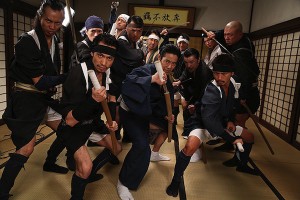
Why Don’t You Play in Hell? (Sion Sono, Japan, 2013, 126 min)
Wisconsin Film Festival, Thursday, April 10, 8:00pm»
This is good clean fun, if by clean you also include things like a young girl sliding across a tile floor covered ankle-deep in blood and crashing into a kitchen where her mother has just slain Yakuza would-be assassins. In this love-letter to psychotronic grindhouse cinema, young auteur Hirata (Hiroki Hasegawa) and his “Fuck Bombers” cinema club dream of making the ultimate action film. Meanwhile two feuding Yakuza gangs are fighting over, among other things, a gang leader’s daughter, who once was a famous toothpaste commercial star, until her mother killed all of those nasty men I mentioned in the first sentence. At some point, of course, both narrative threads come together in a hyperviolent showdown played out in front of Hirata’s cameras.
While the film is shamelessly entertaining, my main complaint is about its length. Again, I love long films, but most genre-dependent films (like those to which this film pays tribute) play much better in the 90-minute range. There’s really not enough here to sustain a full two hours, and I mostly blame the sluggish and repetitive first half. The film wants (and at times tries a bit too hard) to be crazy, but it doesn’t reach bat-shit crazy until the finale. When a female cinematographer has a full 35mm rig in one hand, and an automatic weapon in the other hand, you realize that Godard was right: all you need to make a movie is a girl and a gun. (JLK)
